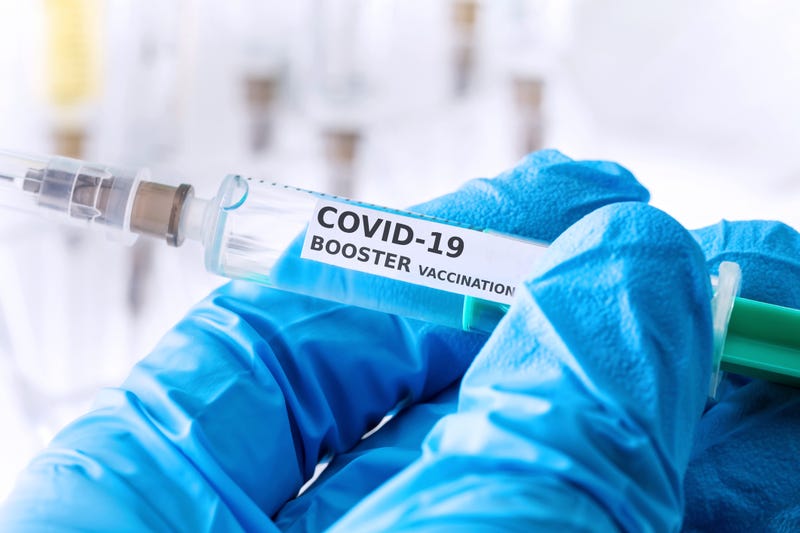
PHILADELPHIA (KYW Newsradio) — Pfizer asked U.S. regulators Tuesday to allow boosters of its COVID-19 vaccine for anyone 18 or older, a step that comes amid concern about increased spread of the coronavirus with holiday travel and gatherings.
However, some experts including an FDA panel member from Philadelphia are quick to point out the first shot remains more important than the third.
"Primarily, I think people should know that if they've gotten two doses of vaccine that they're protected and that they haven't gotten any doses. They haven't been protected," said Dr. Paul Offit, director of the Vaccine Education Center at Children's Hospital Philadelphia.
He said that in his opinion, there are groups that will benefit from a booster, like people 65 and older.
But he says that for younger, healthier people, the initial two-dose regiment remains effective at the primary goal of preventing serious illness and death.
“If you look, for example, at the University of Pennsylvania Children's Hospital, Philadelphia children over 12 ... who are in the intensive care unit aren't there because they haven't gotten the third dose. They're there because they haven't gotten any doses," he said.
“As Dr. Michelle Wollensky, head of the CDC said, we're not going to boost our way out of this pandemic. The focus should be on primarily vaccinating the unvaccinated not boosting the vaccinated.”

Pennsylvania Health Secretary Alison Beam said in the first six days the vaccine was available for 5-to-11 year-olds, 18,841 children got the first dose. She said that’s 2% of all eligible age groups that they cover, which does not include Philadelphia.
Dr. Offit said it’s important children are protected, and while he says he understands parents making the choice to wait to get their kids vaccinated, he points out that is a choice.
“(The) choice to risk the disease, and hopefully, while you're waiting, your child doesn't have to suffer this disease or be hospitalized by it because that is the risk you're taking. There are never risk-free choices," said Dr. Offit.
“When the virus first rolled in this country earlier last year, about 3% of infections occurred in children. Now it's closer to 27%. This delta variant has found that younger age group and is now infected them and children can be hospitalized, and they can go to the ICU and they can die.”
Pfizer is submitting early results of a booster study in 10,000 people to make its case that it’s time to further expand the booster campaign.
While all three vaccines used in the U.S. continue to offer strong protection against severe COVID-19 illness and death, the shots’ effectiveness against milder infection can wane over time.

Pfizer’s new study concluded a booster could restore protection against symptomatic infection to nearly 96%, even as the extra-contagious delta variant was surging. Side effects were similar to those seen with the company’s first two shots.
A median of 11 months after their last Pfizer vaccination, trial participants were given either a third dose or a dummy shot. Researchers tracked any infections that occurred at least a week later, and so far have counted five cases of symptomatic COVID-19 among booster recipients compared to 109 cases among people who got dummy shots.
The Biden administration had originally envisioned boosters for all adults, but faced a stinging setback in September when the FDA’s scientific advisers rejected extra Pfizer doses for everyone. The panel wasn’t convinced that young healthy people needed another dose, particularly when most of the world’s population remains unvaccinated.
Still, under today’s policies about 2 of every 3 vaccinated adults is expected to qualify within the next few months -- and many who don’t nonetheless can score an extra shot because most vaccine providers don’t check qualifications.
And regardless of the initial vaccination, the U.S. has cleared getting a booster of a different company’s vaccine, what’s called mixing and matching.

The current rules: People who initially received Pfizer or Moderna vaccinations are eligible for a booster six months later if they’re 65 or older, or are at high risk of COVID-19 because of underlying health problems or their job or living conditions. Because the single-dose Johnson & Johnson vaccine hasn’t proven as effective as its two-dose competitors, any J&J recipient can get a booster at least two months later.
If the FDA authorizes Pfizer boosters for all adults, the Centers for Disease Control and Prevention then will make recommendations for how to use them.
Globally, boosters also are a hodge-podge. Some countries restrict them to older or medically fragile people while others have few restrictions. Israel, for example, has authorized Pfizer boosters for anyone 12 and older.
_
The Associated Press Health and Science Department receives support from the Howard Hughes Medical Institute’s Department of Science Education.




